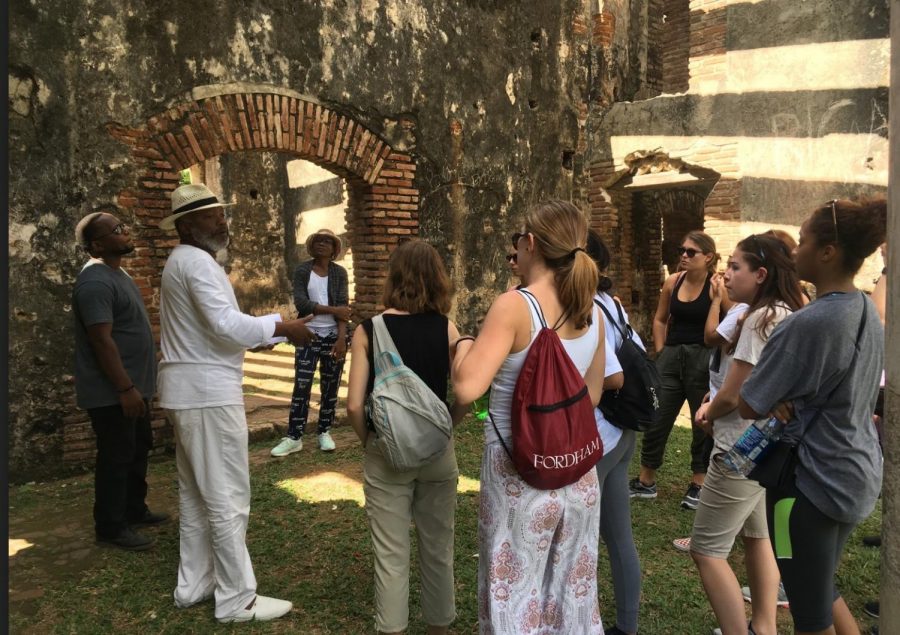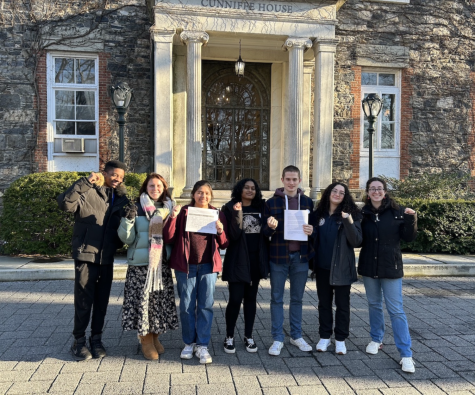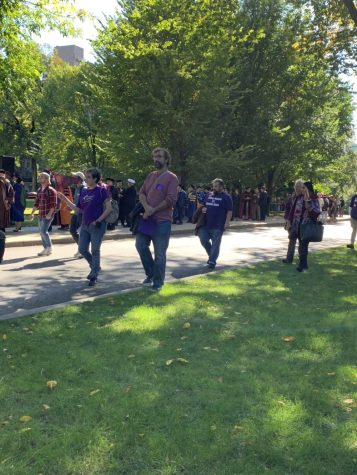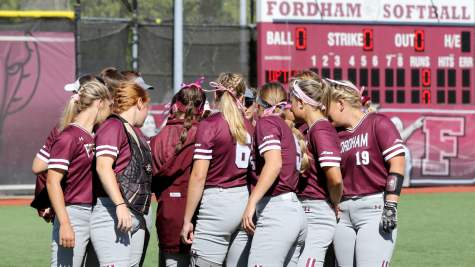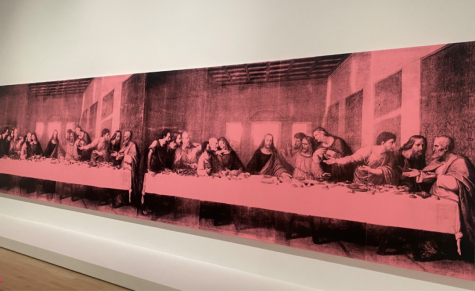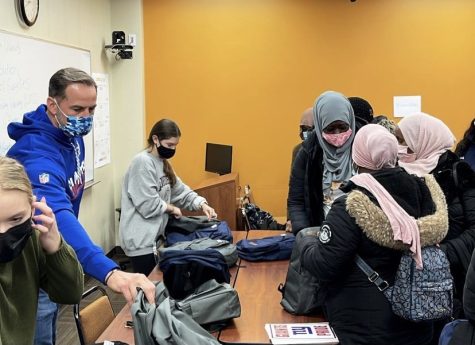GO! Makes Changes to Be More Inclusive
Photo Courtesy of Anna Diguiseppe
GO! leaders and the E-board is working to explain to the Fordham Community understand the GO! is more about cultural immersion and understanding than service.
Colorful posters advertising cultural immersion and service trips to locations across the U.S. and around the world adorn the front window of McGinley Center, changing every season with the different Global Outreach (GO!) trips Fordham offers. A lot of students around Fordham’s campus know about GO! on a basic level — a friend or roommate went on a trip, they bought a sticker or a grilled cheese for a fundraiser, or they went to an information session about the program freshman year.
According to Michelle Cisneros, FCRH ’21, who went on a GO! Trip to Mexico and is now on the GO! executive board, many students do not understand the true purpose of GO! trips.
“GO! Projects are not service trips,” she said. “You’re getting this unique experience where you’re learning from people in specific communities that you wouldn’t have otherwise interacted with and getting the real, on the ground information about how they’re feeling and how the community is feeling about certain issues.”
To reinforce the learning and understanding aspects of GO! rather than just the service portions, Cisneros said that students read an article titled “To Hell With Good Intentions” and learn about the place and community they are visiting before leaving.
GO! trip leader Kristen Sulewski, FCRH ’20, reinforced this idea. She explained that before heading to the Dominican Republic she and her team are learning Spanish phrases, learning about the history of the Dominican Republic and reading about current social issues in the area. She said her trip is mostly immersion rather than service. Sulewski went to Mississippi a few years ago on a trip that she said was largely service based, but she still learned a lot about the area and the people with whom she worked.
“I know so many other schools have quote-unquote, ‘alternative breaks’ where you just sign up and pay your way without meeting anybody on your trip or learning anything about where you’re going,” said Cisneros. “You just kind of roll up and do whatever service aspect and then leave. The thing I love about GO! is you get to know the people you’re going with. You get to know your community partner and you learn about where you’re going.”
Since being incorporated with other social justice programs like Pedro Arupe and Urban Plunge at Fordham’s Center for Community Engaged Learning (CCEL), GO! has also tried to assign a specific social justice topic to each trip. Sulewski’s trip to the Dominican Republic is focusing on migration and immigration, and the domestic trip to New Orleans, for example, will examine civil rights and discrimination.
Cisneros said she personally learned about immigration on her trip to Mexico when they visited a migrant center.
“After you go and come back you just want to keep learning and growing your knowledge of social justice,” said Cisneros. “For me extending my knowledge from GO! translated very directly into declaring a double major in Latin American studies, volunteering at an advocacy center here in the city … and subsequently doing research this summer about New York City as a sanctuary city.”
Other people will become more involved with CCEL, Pedro Arupe or even go on another trip.
Cisneros recommends that students pick a topic, rather than a place, when deciding which trip they might like to go on. She also said sometimes domestic trips can be an easier way to ease into the program for students with less social justice experience, but that is not true in all cases.
She recognized the financial aspect of domestic compared to international trips can weigh heavily on where students choose to travel. The program offers scholarships and teams fundraise to offset their costs.
“We’re aware that the inclusivity from a financial standpoint is not there, but that is also something that is difficult to help because you’re paying, for example, for international flights and you also have to pay these community partners,” said Cisneros. “The way they’re making their living is hosting groups like Fordham students. You’re not getting housing and food for free so there is also that aspect of things that we can help but only so much.”
The team selection process for GO! has also changed under its new administration in CCEL. Sulewski explained that when she was picking her team for GO! Dominican Republic, that will travel in January, she had a list of applicants who had listed her trip as their first choice. This way students only had to interview for their top choices rather than to every trip they applied as was the previous process.
She said it was a 50-50 balance between the CCEL administration and trip leaders in the process of deciding who would fit best on each team. Sulewski said she asked those she interviewed questions about past mission trip experience, questions to get to know them and about what they thought they would struggle with on the trip.
CCEL Director Arto Woodley explained the purpose of the altered process in an email to the Ram.
“We have condensed the process for students applying for the program,” wrote Woodley. The intent is to elevate everyone’s ability to engage in asset based community relationships that values the strengths of each entity. This is in contrast to a mission oriented service model that assumes that Fordham and its students can solve community issues.”
The other change GO! has made since becoming a part of CCEL is administrative. The program used to be run by a single director, but now several staff administrators work with students to explain the projects, according to Executive Board President Anna DiGiuseppe, FCRH ’20.
“Since becoming a part of CCEL, GO! has changed only in logistics and not in mission,” DiGiuseppe wrote in an email to the Ram. “The change from being its own office to being part of the greater CCEL office has merely opened doors for GO! and allowed the program to use the resources of the entire center and created a space for more collaboration.”
DiGiuseppe also said she expects more concrete changes in the future including in-depth training programs for leaders and possible academic components.
In the future, DiGiuseppe also wants to change the perception of she feels GO! as exclusive.
“Global Outreach is attempting to promote this diversity through better marketing, providing more scholarships for participants, and restructuring our application process to give first time participants and upperclassmen a slight upper hand.”
Sulewski’s team is shifting towards the more inclusive program that DiGiuseppe envisioned. Teams are often largely female, from Rose Hill, and resident-based but her team has two men, multiple commuters and Lincoln Center students.



































































































































































































